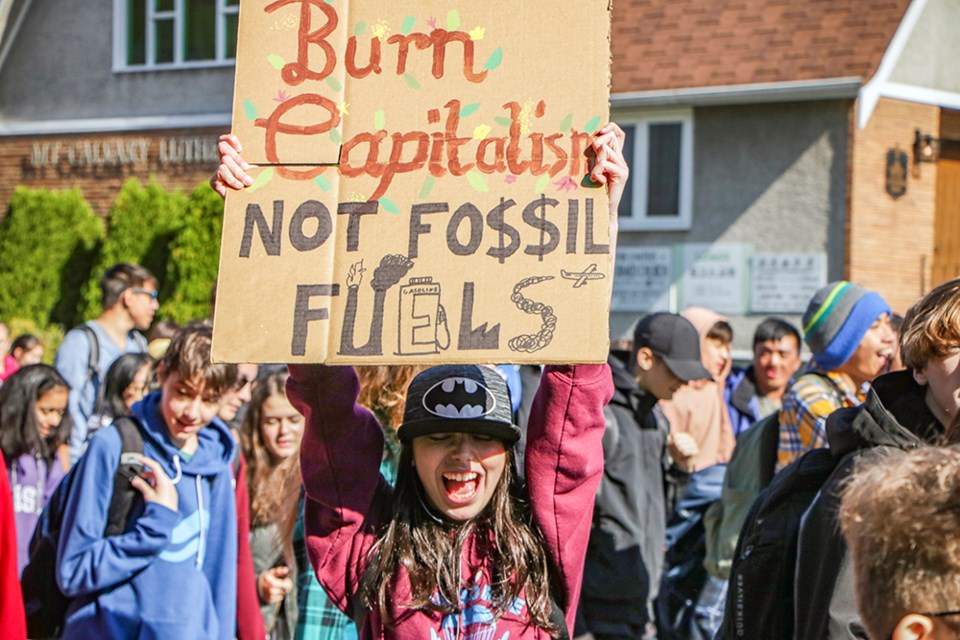A biting wind and a warm sun clashed Friday morning, as the time for action approached. It was 10:45 a.m. outside New Westminster Secondary, and already a few small enclaves of students had congregated at the entrance to the Massey Theatre.
“Reduce, reuse, revolt,” read a sign carried by one student, held up for a New Westminster Police Department officer to see as he rolled up to the scene on his motorbike. The officer smiled and greeted the boy and his friends warmly.
The atmosphere ahead of the New West climate strike was abuzz with quiet murmurs of excitement, a warmth amid an otherwise brisk fall morning.
As the 11th hour approached, the crowd grew stronger.
11 a.m., Massey Theatre
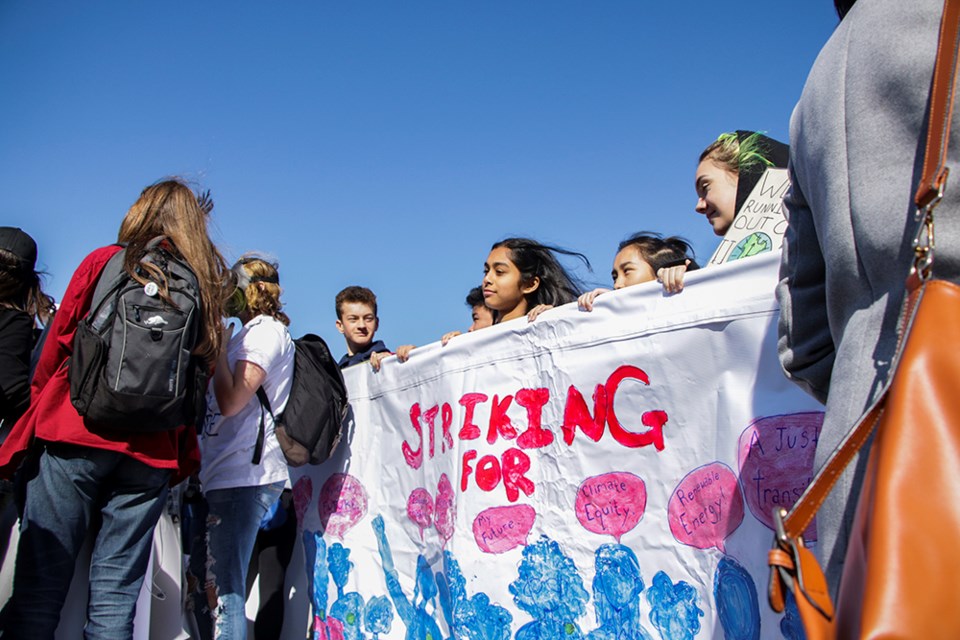
A banner, which would lead hundreds of students down the streets of New West, is unfurled for a quick photo shoot. “Striking for…” the banner’s headline reads, with cartoon silhouettes calling out the various causes below: “Indigenous rights.” “Clean water and air.” “Climate equity.” “Renewable energy.” “My future.”
Their message wouldn’t go unheard – a few local politicians participated in the strike.
New West-Burnaby’s NDP MP Peter Julian said he believes the climate strikes will continue to push climate change in the public dialogue, especially during the current federal election.
Climate change has seen unprecedented consensus as an election issue this year, consistently ranking among the top issues federally.
In part, that’s been driven by an increasingly dire message from the globe’s scientists, including last October’s report from the Intergovernmental Panel on Climate Change (IPCC).
The IPCC determined the world has until 2030 to cut emissions by 45 per cent below 2005 levels and until 2050 to become carbon neutral – or else risk increasing major floods, massive wildfires and devastating droughts.
Since the report was released, the climate strike movement, popularized by Swedish teen activist Greta Thunberg, has continued to grow. Thunberg, too, has gained an ever-growing platform.
“How dare you?” the 16-year-old demanded of world leaders in a powerful speech at the U.N. Climate Summit last week.
11:30 a.m., Sixth Street
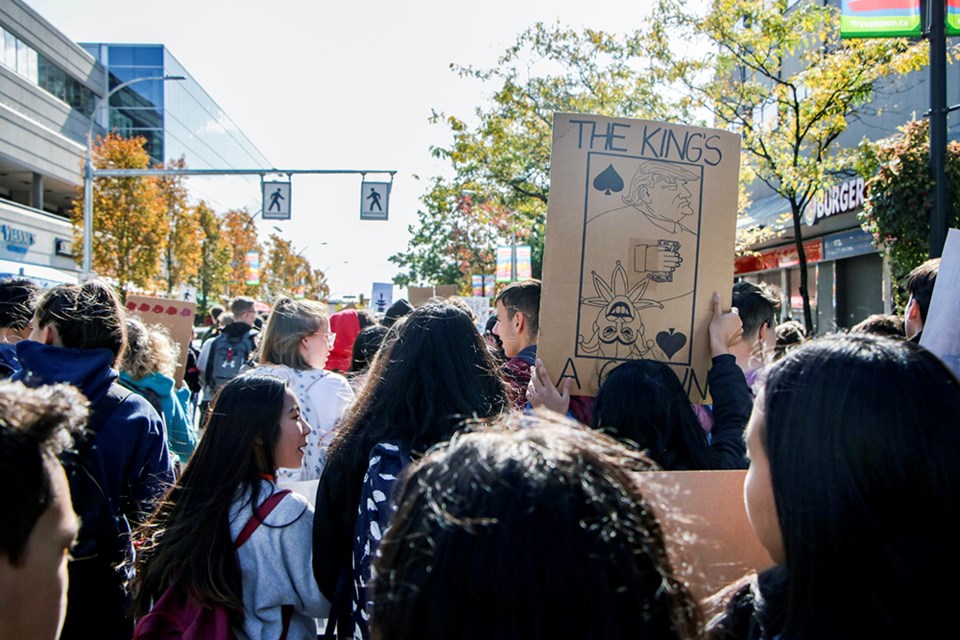
Back in New West, the movement had seen monumental growth from the 50-odd students striking in March. About 500 students marched down Sixth Street on Friday, closing the typically busy commercial road and chanting common slogans from the movement.
“Hey! Hey! Trudeau! TMX has got to go!” went one such chant (sung particularly loudly outside New West-Burnaby Liberal candidate Will Davis’s office), referencing the controversial Trans Mountain pipeline expansion project.
Signs carrying similar slogans, from “no Planet B” to “burn capitalism” to “I am begging you” permeated the crowd as it flowed toward downtown.
“I think it’s great that students were able to organize and mobilize about something that they’re passionate about,” said school board Trustee Gurveen Dhaliwal, while marching with the students, adding that she hasn’t ever seen anything quite like it in New West.
All the while, the reserved murmurs have grown to chatter and laughter among excited students. Despite the urgency of their message, there’s an undeniable optimism in the air.
12 p.m., Expo Line
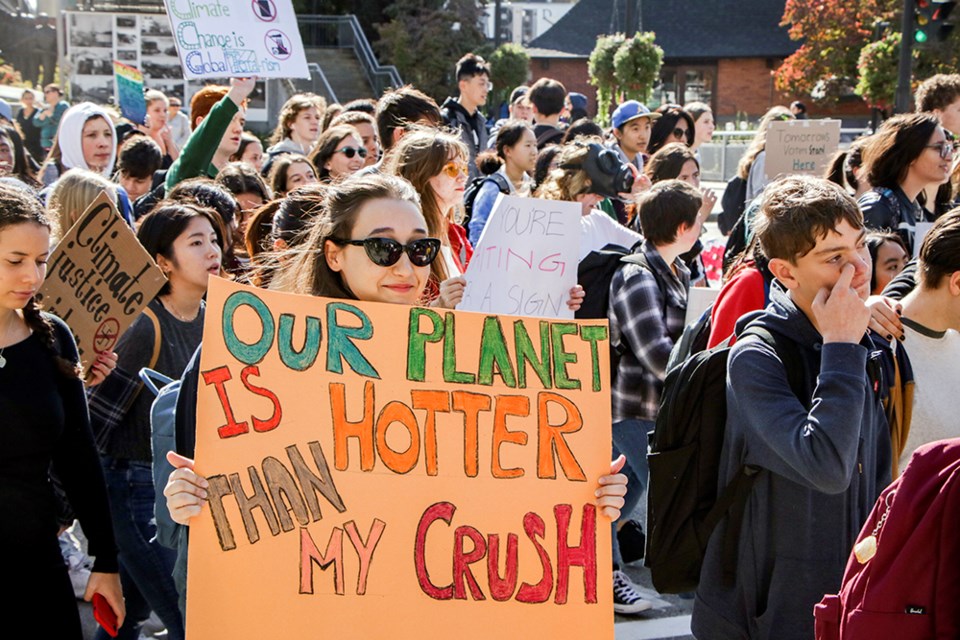
The march halted outside a downtown SkyTrain station, where an officer greeted two organizers of the march and praised them for their work. Students then flooded the station and boarded trains bound for Vancouver.
“The turnout is a lot bigger than I expected,” said Karter Deedman, one of the organizers of the event in New West, on the way to the station platform. “This is great.”
Deedman pushed back against critics who suggested the day was an excuse for students to skip school.
“This is just so much more important to me than a single day of education ever is because this is our future, which could be millions of years to come for our bloodline, whereas a day of school might teach me how to do a tiny bit of pre-calculus,” Deedman said.
12:40 p.m., Waterfront Station
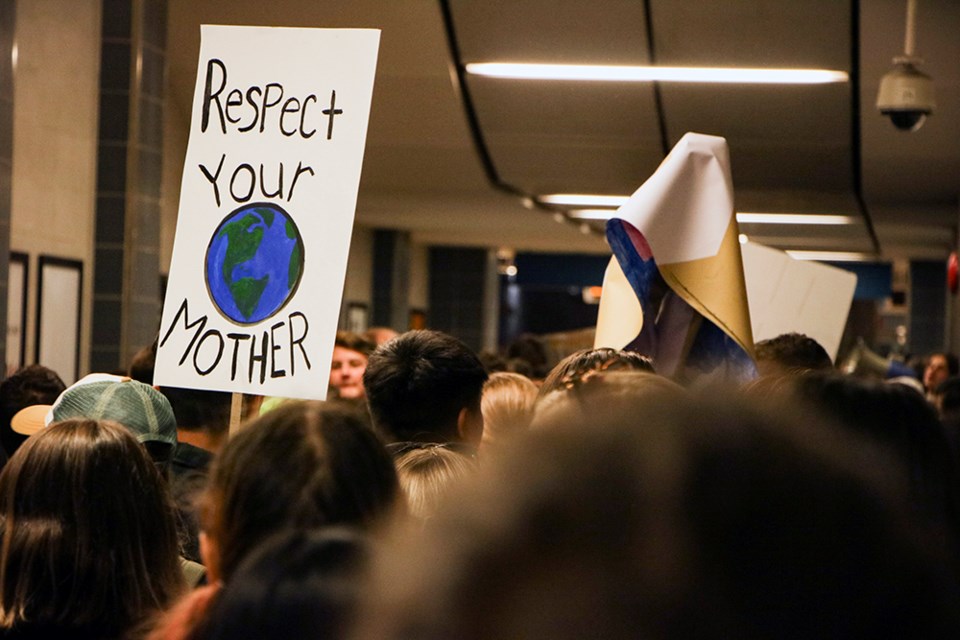
By the time the strike had reached Waterfront Station in Downtown Vancouver, countless more students boarded train after train at every stop along the way.
A river of students flowed up from the Expo Line platform, filling half the main foyer of Waterfront.
There, one student with a megaphone led a chant – “What do we want?” “Free public transportation!” “When do we want it?” “Now!” – before leading the strike to the Canada Line.
In a long hallway, the climate strikers waited their turn to board trains bound for city hall. One self-described “bitter old man” said the strike “drives me crazy,” citing the environmental damage of rare-earth minerals that go into the cell phones owned by many students.
The Expo Line may have been busy, but the Canada Line was packed. Rather than the quiet but excited chatter from the previous train, the student body aboard the Canada Line was a choir of excitement.
1 p.m., Broadway-City Hall
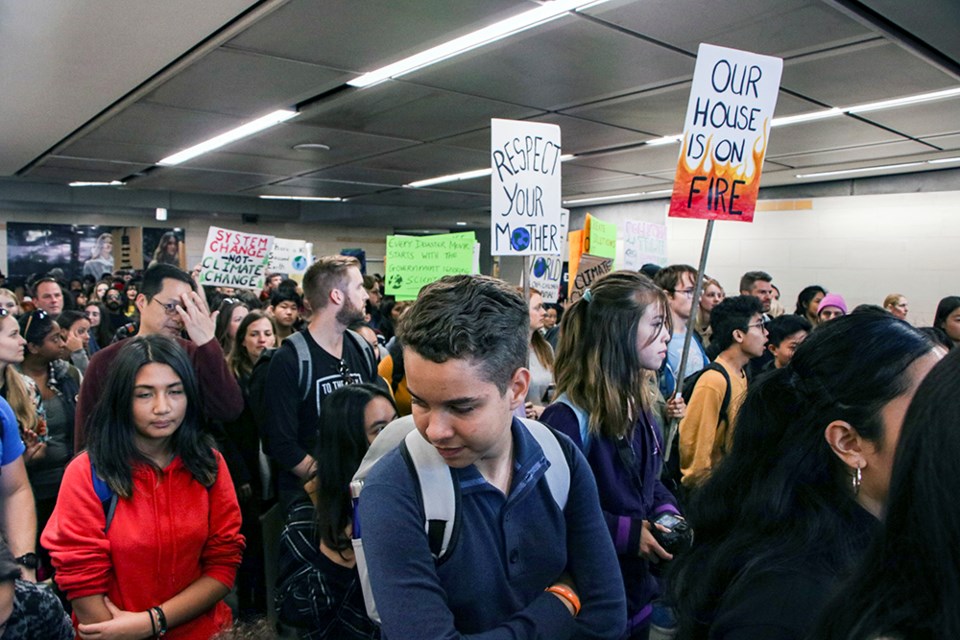
As the Canada Line train pulled into Broadway-City Hall from the north, a dense stream of students flowed up from the platform. Looking across the tracks, another train had stopped from the south, generating a similarly steady flow of climate strikers.
Deedman told The Record 20,000 or more students were expected to pack the area around Vancouver City Hall.
That number would be blown out of the water by the actual turnout – the Vancouver Police Department estimates 100,000 people showed up to Friday’s climate strike, overwhelming the park outside Vancouver City Hall and flooding Cambie Street.
Drums and brass horns sounded from somewhere in the park, a choir sang somewhere else and a band played “He’s Got the Whole World In His Hands” on the street.
It was no longer one generation’s fight at city hall. Infants held in parents’ arms were contrasted by seniors who could be grandparents to some of the students present.
Generations blended together in a united call for action on climate change. Their message was urgent – cut down on greenhouse gas emissions now, or we and our children will face the consequences.
Some might feel despair from the current climate prognosis. But in the face of such a daunting task ahead, 100,000 students, grandparents, toddlers and everyone in between poured over the Cambie Street Bridge in a statement of hope.
